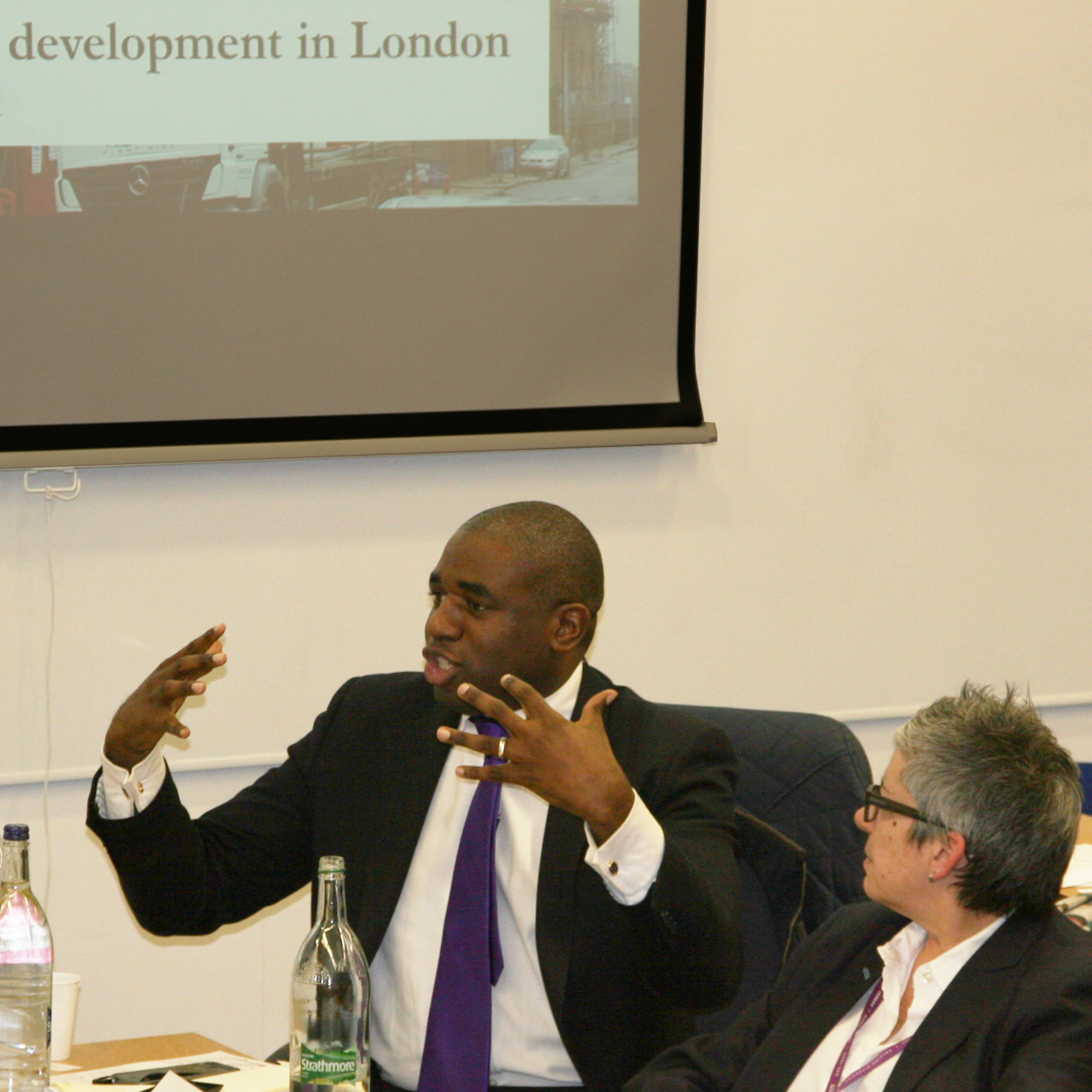 On 10 December, LSE London held a debate and expert panel further to explore the issues constraining the supply of housing in London. Speakers included:
On 10 December, LSE London held a debate and expert panel further to explore the issues constraining the supply of housing in London. Speakers included:
- Paul Cheshire, Emeritus Professor of Economic Geography, LSE
- Fran Tonkiss, Director, LSE Cities Programme
- Chris Hamnett, Professor of Geography, King’s College London
- Jo Negrini, Executive Director of Development and Environment, Croydon
- David Lammy, MP for Tottenham
There was a considerable measure of agreement especially on ways forward. However, as one might expect with such a diverse panel and such a complex issue, opinions were, at least in part, divided. The impact that planning regulation has on stifling land supply, the role developers play in holding back development to ensure profits and the type and style of housing on offer were all issues about which our panellists differed.
Paul Cheshire began by setting out his view that planning has created a manufactured policy failure.  Planning regulation has stifled the supply of land: the greenbelt prevents London from growing outwards, and historic preservation policies make growing upwards difficult—and these are the largest cfactors contributing to London’s current predicament. The average number of new homes produced per annum between 1980-2014 was only about 16,600—a far cry from the 42,000 homes pledged by the Mayor or the some 50,000 homes estimated to be needed per annum to address the shortfall. For Cheshire, only a radical change to current planning policy and freeing up private market actors to allow them to build upwards and outwards will begin to address the shortage of housing in London.
Planning regulation has stifled the supply of land: the greenbelt prevents London from growing outwards, and historic preservation policies make growing upwards difficult—and these are the largest cfactors contributing to London’s current predicament. The average number of new homes produced per annum between 1980-2014 was only about 16,600—a far cry from the 42,000 homes pledged by the Mayor or the some 50,000 homes estimated to be needed per annum to address the shortfall. For Cheshire, only a radical change to current planning policy and freeing up private market actors to allow them to build upwards and outwards will begin to address the shortage of housing in London.
Other panellists criticised the way the planning system operates, pointing to the flexibility that allowed developers to ‘game’ the system.This meant land prices were bid upwards, since developers expected to be able to negotiate higher densities and lower contributions of affordable housing than planning guidelines would permit. Jo Negrini of LB Croydon argued forcefully that it was vital to train planners effectively to negotiate effectively with developers and give them the skills to critically evaluate development appraisals. Otherwise, planners would always be on the back foot in negotiations, unable to secure the type, tenure and style of housing that would most benefit the community overall.
 Several of our contributors including David Lammy, MP for Tottenham, and Professor Chris Hamnett of King’s College London, questioned whether we were managing to build the right kind of housing for the people of London. Were luxury housing and high-rise flats what was needed in a city where many people work at the margins, live in families and find it hard to make ends meet? As Fran Tonkiss, Professor in Sociology at the LSE commented, in the rush to build more housing we must avoid a binge mentality that sees us building without considering the role good architecture and design plays in placemaking and long term well-being.
Several of our contributors including David Lammy, MP for Tottenham, and Professor Chris Hamnett of King’s College London, questioned whether we were managing to build the right kind of housing for the people of London. Were luxury housing and high-rise flats what was needed in a city where many people work at the margins, live in families and find it hard to make ends meet? As Fran Tonkiss, Professor in Sociology at the LSE commented, in the rush to build more housing we must avoid a binge mentality that sees us building without considering the role good architecture and design plays in placemaking and long term well-being.
The evening also brought forward a number of ideas—some truly innovative and some just common sense—to help move us toward a better mediated housing market. Many called for government to play an increased role in housing development, whether through increased borrowing powers for local authorities or central government subsidy. Likewise parcelling up larger sites to increase the number of developers working in a given area was seen as a way better to encourage competition, increase the speed of delivery and foster variety in the housing stock.
Finally, and really quite encouragingly, Jo Negrini discussed some innovations occurring in Croydon, where the council has formed dynamic partnerships withdevelopers. It had set up a revolving investment fund to enable those hungry to make a difference to Croydon’s development to invest in the borough. In addition a TIF (Tax Increment Financing)-style mechanism had been created to help the council leverage in the vital infrastructure needed to support new development.
All participants agreed that the planning system should protect good quality countryside and habitat, but most wanted a better understanding of the costs and benefits of constraining development. Most importantly, we need to be clear about the objectives of constraints in different contexts, and to understand whether the constraints actually do achieve these objectives. Then almost all agreed that agreed decisions must stick. This would speed up the process of planning, reduce the costs of uncertainty and take the ‘hope’ value of planning change out of land prices.
but most wanted a better understanding of the costs and benefits of constraining development. Most importantly, we need to be clear about the objectives of constraints in different contexts, and to understand whether the constraints actually do achieve these objectives. Then almost all agreed that agreed decisions must stick. This would speed up the process of planning, reduce the costs of uncertainty and take the ‘hope’ value of planning change out of land prices.
Most also agreed that there was no case for reducing building standards – development needs to meet current and future demands for higher quality and costs should be reflected in lower land values.
Finally all saw the benefits of building up revolving funds which enable local authorities to support infrastructure provision and to realise the benefits of their investment in order to re-invest in the future.
Overall we left the debate feeling energised that academically, politically and practically the issue of housing was again making its way up the agenda in London. There was very considerable agreement around policies and practices, which could achieve more and better quality investment. And there was commitment to finding proactive and innovative ways to address the housing crisis.
Podcast recordings of the panelists’ presentations are available below:
Debate Introduction by Tony Travers and Nancy Holman
Paul Cheshire
Fran Tonkiss
Chris Hamnett
Jo Negrini
David Lammy



